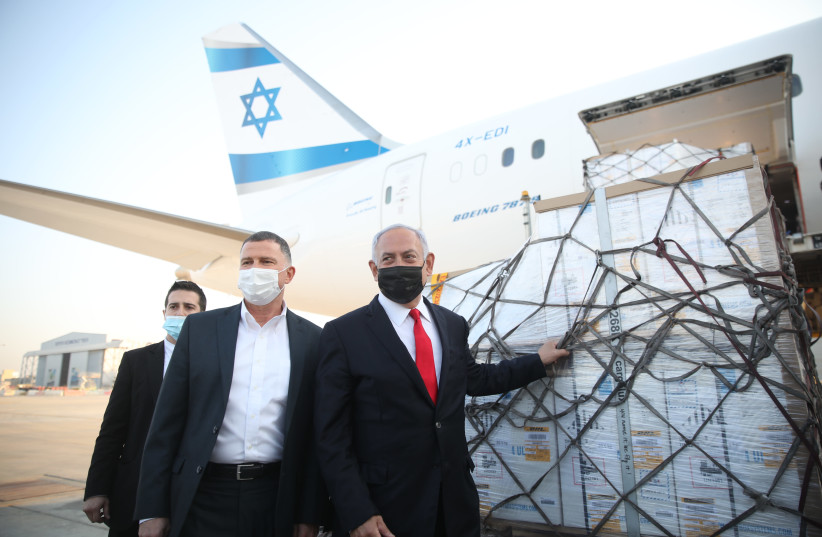Health Ministry considering round-the-clock vaccination.

Some 700,000 doses of Pfizer’s coronavirus vaccine landed in Israel on Sunday and were met at Ben-Gurion Airport by Prime Minister Benjamin Netanyahu and Health Minister Yuli Edelstein.
“This is a great day for Israel, with a huge shipment that has arrived in the framework of Operation Back to Life: a plane full of injections of encouragement,” Netanyahu said, informing the public that next Sunday an additional shipment would arrive, “and we will start vaccinating the next group: people aged 50-60.”
According to the agreement between Israel and Pfizer, the company will deliver tens of thousands of doses to Israel every week until every Israeli who wants to be inoculated has been jabbed.
To get this done, the prime minister said that the country would increase the number of people vaccinated per day to 170,000 beginning immediately. Coronavirus Commissioner Prof. Nachman Ash said later that the goal was to vaccinate as many as 200,000 people per day – some with their first dose and some with their second.
“Tonight, we will sit down with the health funds and prepare for the next stage of the vaccination campaign,” Edelstein said.
“I am certain that our amazing medical teams… will get this done,” Netanyahu added.
The announcement came on the same day the Health Ministry announced that more than 72% of Israelis over the age of 60 had been vaccinated against the virus and that Edelstein said he had met with his staff and instructed them to evaluate the possibility of offering vaccinations throughout the night.
At the airport, Edelstein, like Netanyahu, committed that by mid-March, Israel will reach five million vaccinated citizens.
The Health Ministry already is opening up vaccination to educational staff and said that next in line are people over the age of 55.
The Education Ministry informed teachers on Sunday of the process for getting inoculated and said that the campaign would also include other school staff, such as secretaries, aides and counselors.
On Sunday, educators and school staff were contacted via their principals or educational directors about the opportunity to get vaccinated. Educational staff who are interested must express consent and then their names and details will be turned over to the Health Ministry and health funds. The funds will then proactively contact the staff to set an appointment.
Priority is first being given to those people who are expected to teach during the lockdown, like special education teachers and staff, and those that work in boarding schools or with youth-at-risk.
It is expected that the first teachers will begin getting inoculated as early as Wednesday.
The Teachers’ Union had said that if teachers were not vaccinated it would strike and educators would not return to their classrooms after the lockdown. Education Minister Yoav Gallant had stressed the importance of inoculating teachers and said it was part of the deal for his agreeing to close schools for two weeks.
So far, more than 1.8 million Israelis have received their first dose of the vaccine, Edelstein reported early Sunday. More than 40,000 Israelis were inoculated on Saturday alone.
As mentioned, almost three-fourths (72%) of people over the age of 60 have been inoculated, with 59% of all those who have been vaccinated being over 60.
Ash said that there are quite a few cases of people being infected around the time of their vaccination, and that it is still unclear if they caught the virus shortly before they were inoculated or afterwards.
“For them, immunity will be obtained through the disease and not the vaccine itself,” he said.
He also noted that while in principle people should receive their second doses wherever they got their first – and therefore some people should receive their second dose at area hospitals. Those who were inoculated at one branch of a health fund could potentially get their second dose at a different branch.
It is still unclear whether hospitals will take part in the rest of the vaccination campaign. The Health Ministry has said it prefers to work with the health funds, but in order to maintain the pace of up to 200,000 people being inoculated per day, using the hospitals could be necessary.
As reported by The Jerusalem Post
